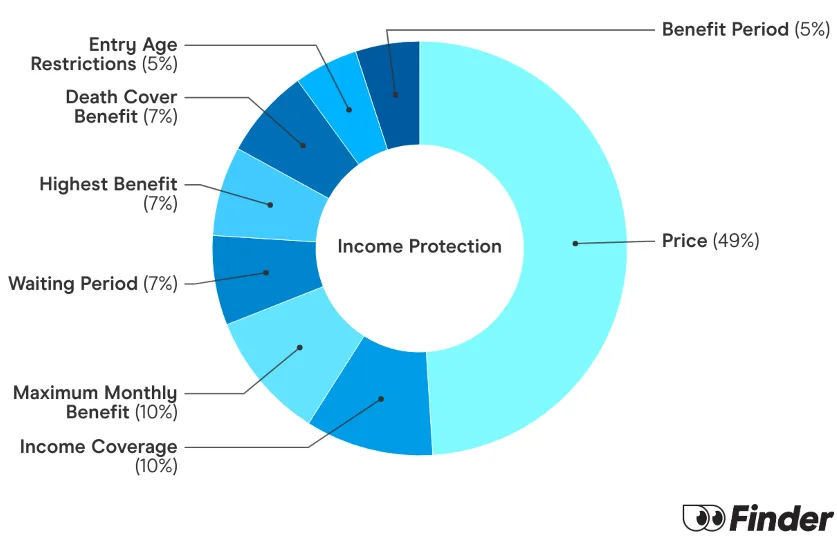Key takeaways
- Income protection is available for entrepreneurs and start-up founders.
- It's one of a few insurance products that could be relevant to a new business.
- There are some key differences to the application process you'll need to be aware of.
Is income protection insurance worth it for entrepreneurs?
Yeah, income protection is probably worth it for a start-up founder, or similar style of entrepreneur. It can be a valuable asset for entrepreneurs. Unlike employees who often have sick leave and other benefits, entrepreneurs are solely responsible for their income. If they become unable to work due to illness or injury, their income can be severely impacted.
Here's why income protection insurance might be a good choice for entrepreneurs:
- Income replacement: In the event of illness or injury, the insurance can provide a regular income stream to replace lost earnings.
- Financial stability: This can help maintain a stable financial situation for the entrepreneur and their family.
- Business continuity: While it doesn't directly protect the business, it can help the entrepreneur maintain their personal finances, which may indirectly benefit the business.
- Peace of mind: Knowing that there's financial support in place can reduce stress and anxiety.
Finder survey: What prompted Australians to take out income protection insurance?
| Response | |
|---|---|
| Starting my own business | 7.2% |
Compare direct income protection policies
Compare other products
We currently don't have that product, but here are others to consider:
How we picked theseFinder Score - Income Protection
Income Protection is a little complicated and a lot overwhelming. That's why we made the Finder Score, to make it easier to compare Life Insurance products against each other. Our experts analysed over 12 products and gave each one a score rank out of 10.
But a higher score doesn't always mean a product is better for you. Your situation is unique, so your policy choice will be too. Don't think of Finder Score as the final word, but as a good place to start your life insurance comparison.
Need a custom policy? Speak to a broker.
What are the key benefits offered by income protection?
Income protection protects you with a financial safety net in the event you sustain any injury or illness that prevents you from working by providing an ongoing monthly payment that can be used to cover all the expenses that are generally met through your regular income. Therefore, it makes sense to have income protection in place, without which you may not even have the money needed to get back on your feet. The features of income protection insurance include:
- Terminal illness benefit. Forward benefit of the death benefit paid if insured suffers a terminal illness under the policy
- Death benefit. Policy owners beneficiaries provided with a lump sum benefit of a multiple of the monthly benefit in the event that the policy owner passes away.
- Specified injury benefit. Benefit provided if the policy owner suffers an injury and is still able to work. Only available for specific injuries.
- Bed confinement benefit. Insured provided with additional benefit if they are confined to bed for a specified period of time.
- Family care benefit. Additional benefit paid for a specified of time if a member of the insureds family suffers a reduction in their after-tax income as a result of providing extra care for the insured.
- Home care benefit. Additional benefit paid to help cover the costs of having a professional carer.
- Relocation benefit. Benefit provided to assist covering the travel costs of the insured if they become disabled overseas.
- Rehabilitation benefit. Benefit paid to help cover the costs of enrolment in an approved rehabilitation course.
Why is income protection so important for small business owners?
As a small business owner, the importance of income protection is much greater than if you were an employee. As a small business owners, you won't be entitled to the included benefits of an employee:
- Paid sick leave. If you are unable to work for an extended period of time, your company could give you paid sick leave, which means your income will not be affected.
- Annual leave. Similarly, if you have not taken your annual leave every year and have back leave pending, you can use those days if you were injured and could not work for a few weeks.
- WorkCover. If you do sustain any kind of injury at work that leaves you unable to do your regular job, then your employer has to pay you worker’s compensation benefits. Although this money may not be enough to replace the entire income that you have lost, it will at least give you some kind of buffer till you regain your health.
Hence, you need to ensure that you have an alternative means of income that will make up for the loss of your business income. That can easily be achieved by opting for an income protection insurance policy.
What expenses might a small business owner need to cover?
In the event that a small business owner becomes temporarily disabled, there are a whole range of expenses that they may struggle to cover with what savings they have. Some of these may include:
- Car hire
- Utility bills
- Cost of machinery
- Interest on property loan
- Medical expenses
- Rent of business premises
- Staff wages and superannuation
- Hiring a replacement to step into their role while they recover
Do young entrepreneurs and start-up owners need income protection?
Australia has seen a rise in the number of entrepreneurs starting businesses, especially amongst young people. According to the Bankwest Business Trends Report 2014, the majority of the 15,300 new businesses that opened their doors that year were started by Australians aged 25 to 34. While starting up any business is risky, doing it at a young age can make it even more perilous. Some of the disadvantages young business owners face include:
- Lack of funding. Most young people won’t have the required capital to get the business off the ground on their own, which means they will have to borrow, or use all their available assets.
- No financial safety net. Due to the lack of funding, this means there are usually little or no emergency savings to inject into the business if things go wrong. Loans are also harder to get approval for, as banks view young entrepreneurs with little assets as high risk.
- Heavier workload. Cutting overheads by taking on the majority of responsibilities is something anyone who's started up a business is familiar with, but can be even more taxing on young owners who need to make every dollar count.
Other insurance types for start-ups
If you are rendered unable to work due to illness or injury, these disadvantages can turn a setback into a disaster for your business. If you are a young entrepreneur you should consider the following policies:
- Income protection insurance. Makes up for your inability to earn an income while you recover. This can be a crucial lifeline if you are a young business owner with little savings to fall back on.
- Business expenses cover. This can be bundled with income protection insurance and will cover the fixed costs of keeping your business operating. Again, a potential lifesaver if you have no funds set aside for emergencies.
- Keyman expenses insurance. A lot of entrepreneurial start-ups are two-person operations, with each individual bringing specific skills that are vital to the business. This type of cover will pay towards the costs of replacing a key employee if they can’t work due to illness or injury, a situation that could otherwise paralyse your business or increase your workload to an unrealistic level.
Frequently asked questions
Ask a question
More guides on Finder
-
HCF Income Protect Insurance
Wondering if HCF Income Protection Insurance is right for you? We break down what’s covered, what’s not and whether it offers good value.
-
TAL Income Protection Insurance review
Learn the built-in benefits of TAL income protection to understand how it could work for you. Compare features and get a quote today.
-
Sick leave Australia: What you’re entitled to and when
Find out why income protection is an important tool to combine with your entitled sick leave.
-
Cost of income protection in Australia
Income protection costs can range from around $50 to $160+.
-
Sole trader income protection insurance
Income protection for sole traders provides financial support, via a monthly payment, if you’re unable to work due to illness or injury.
-
Income Protection Insurance vs Mortgage Protection
Does income protection provide the same thing as mortgage protection? Read on and compare.
-
Suncorp Income Protection Insurance Review
Receive income cover for illness or injury with Suncorp Income Protection.
-
Income protection insurance calculator
Find out how much your income protection insurance policy will pay out in the event of a claim. Receive quotes for income protection and apply securely.
-
NobleOak Income Protection Insurance review
NobleOak has been offering personal insurance solutions direct to Australians for over 137 years. Discover the benefits and features available on the NobleOak Income Protection policy and make a secure enquiry for cover.
-
Best income protection, Australia
Looking for the best income protection insurance but not exactly sure where to start? Compare the Finder Awards 2025 insurance winners.


